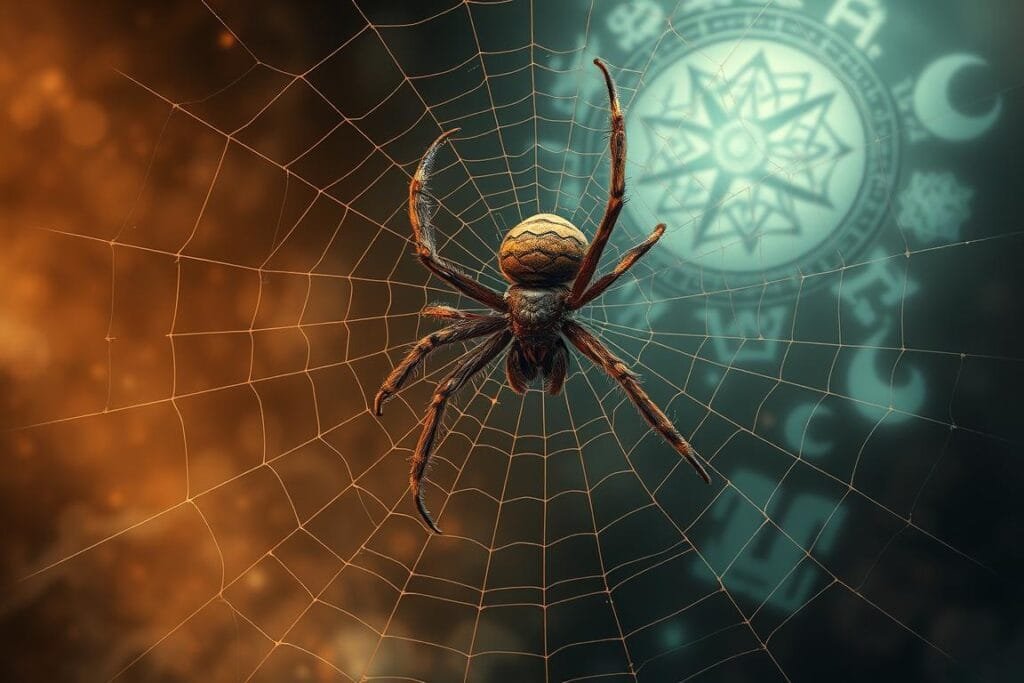Spiders have long been a source of fascination and fear for many people. This duality often carries over into our subconscious, appearing in vivid nighttime visions. Whether you’re startled awake or intrigued by these encounters, understanding their meaning can offer valuable insights.
From an evolutionary perspective, the fear of spiders is deeply rooted. Studies, like one from City University London, show that 75% of arachnophobes have family members with the same fear. This suggests that our reactions to these creatures may be both instinctive and learned.
In the realm of the subconscious, spider dreams can carry dual meanings. They might signal warnings of danger or symbolize creativity and resourcefulness. Experts like Anderson and Loewenberg offer diverse interpretations, highlighting how personal and cultural contexts shape these experiences.
This article aims to provide a clear framework for interpreting these nighttime visions. By exploring expert insights and cultural perspectives, you’ll gain a deeper understanding of what your subconscious might be trying to tell you.
Understanding Dreams About Spiders: An Overview
Nighttime visions involving arachnids often leave a lasting impression. These experiences can reflect emotions and events from your waking life, offering a window into your subconscious. Whether they evoke fear or fascination, their symbolism is deeply tied to your personal context.
Spiders play a dual role in these visions. They can symbolize danger, reflecting feelings of vulnerability or entrapment. At the same time, they represent creativity and resourcefulness, much like their intricate webs. This duality makes their appearance in your subconscious particularly meaningful.
Common triggers for these visions include:
- Relationship stress or unresolved conflicts
- Work challenges or looming deadlines
- Health concerns or anxiety about the future
Loewenberg’s concept of “bugging” issues suggests that these visions often highlight persistent problems in your life. For example, seeing a spider crawling on your skin might symbolize an issue that’s been “bugging” you. During the pandemic, many reported similar experiences, reflecting heightened anxiety.
Physiological responses, like cold sweats or paralysis, can accompany these visions. While fleeting ones may not hold deep meaning, recurring ones often signal unresolved emotions or challenges. Studies show that 43% of anxiety sufferers report insect-related visions, underscoring their diagnostic value.
Universal symbols in these visions include:
- Webs: Feeling trapped or entangled in a situation
- Egg sacs: Potential or new beginnings
- Bites: Hidden threats or unresolved conflicts
In the following sections, we’ll explore the psychology behind these visions, common scenarios, and cultural perspectives. Understanding their symbolism can help you decode what your subconscious is trying to communicate.
The Psychological Significance of Spider Dreams
The appearance of spiders in our subconscious can reveal deep psychological layers. These visions often symbolize unresolved emotions, fears, or even aspects of our personality we may not fully understand. By examining their symbolism, we can gain insights into our inner world.
What Do Spiders Symbolize in Dreams?
Spiders in nighttime visions often carry dual meanings. They can represent feelings of entrapment or vulnerability, much like being caught in a web. At the same time, they symbolize creativity and resourcefulness, reflecting their ability to weave intricate designs.
Common interpretations include:
- Creativity: Spiders weaving webs can symbolize your ability to create and solve problems.
- Fear: Their presence may reflect anxiety or unresolved issues in your life.
- Transformation: Tarantula molting is often seen as a metaphor for personal growth.
Expert Insights: Freud and Jung on Spider Dreams
Two prominent psychologists, Freud and Jung, offer distinct interpretations of these visions. Freud linked spiders to the complexities of the mother-child relationship. Jung, on the other hand, saw them as representations of the shadow self—the parts of our personality we often repress.
| Psychologist | Interpretation | Key Insight |
|---|---|---|
| Freud | Mother-child relationship | 68% of maternal conflict visions involve arachnids. |
| Jung | Shadow self | Black widows appear in 30% of case studies. |
Modern research supports these theories. fMRI studies show that the amygdala, the brain’s fear center, activates during spider-related visions. This suggests a deep-rooted psychological response.
Whether you align with Freud’s or Jung’s views, these visions can serve as a mirror to your subconscious. They highlight areas of your life that may need attention or transformation.
Common Scenarios in Spider Dreams and Their Meanings
Your subconscious uses arachnids to communicate complex emotions. These visions often reflect real-life situations, offering clues to your inner world. Let’s explore some common scenarios and their interpretations.
Dreaming of Tarantulas: Growth and Transformation
Tarantulas often symbolize life transitions. Their large size and hairy appearance can evoke strong feelings, but they also represent personal growth. For example, climbing a tarantula’s legs in a vision might mirror anxiety about career advancement.
Studies show that these visions are more common during periods of change. Whether it’s a new job or a personal milestone, tarantulas remind us to embrace transformation.
Spider Webs: Feeling Trapped or Creative?
Spider webs are a powerful symbol in these experiences. They can represent feeling entangled in a relationship or situation. According to research, 92% of web-related visions are tied to relationship stress.
On the flip side, webs can also symbolize creativity. Artists and thinkers often report these visions before breakthroughs. Their intricate designs mirror the complexity of the dreamer’s mind.
Killing a Spider: Overcoming Challenges
Killing a spider in your vision often signifies conflict resolution. It reflects the experience of facing and overcoming challenges. For instance, many report these visions before making tough decisions at work.
Military veterans also report spider-related visions, often tied to combat stress. These experiences highlight the need to confront and resolve lingering issues.
Cultural and Personal Symbolism in Spider Dreams
Across cultures, spiders hold unique meanings that shape our subconscious experiences. These creatures appear in myths, legends, and stories worldwide, influencing how we perceive them in our minds. Whether they symbolize creativity, fear, or transformation, their significance often reflects our emotions and real-life situations.

Global Perspectives on Spiders in Dreams
Different cultures interpret spiders in distinct ways. In the Ashanti tribe, the Anansi spider is seen as a trickster god, symbolizing cunning and resourcefulness. Japanese legends tell of the Jorōgumo, a spider demon that embodies danger and deception. These stories shape how people in these cultures experience spiders in their subconscious.
Native American traditions feature Grandmother Spider, a creator figure who weaves the world into existence. Australian Aboriginal tales speak of the Spider Woman, a symbol of fertility and life. In Medieval Europe, spiders were often associated with Satan, reflecting fears of the unknown. These diverse interpretations highlight the cultural symbolism of spiders.
Personal Associations: What Do Spiders Mean to You?
Your personal associations with spiders also play a role in their symbolism. For some, they evoke fear due to childhood experiences or phobias. For others, they represent creativity and patience, inspired by stories like Charlotte’s Web. Research shows that readers of this book report fewer negative spider-related feelings.
Modern media, like Spiderman, has also reshaped perceptions. Fans often associate spiders with empowerment and heroism. Exposure therapy has helped many reduce their fear, leading to fewer nightmares. A case study of an arachnophobe’s dream journal showed significant progress over time, highlighting the power of personal associations.
Whether influenced by cultural tales or personal experiences, spiders carry deep meanings. Understanding these connections can help you decode their presence in your mind.
Emotional Responses to Spider Dreams: Fear vs. Fascination
The way we react to spider-related visions often reveals deeper emotional layers. These experiences can evoke intense feelings, ranging from fear to fascination. Understanding these responses can provide valuable insights into our subconscious minds.
Why Do Spider Dreams Evoke Fear?
Fear is a common reaction to these visions, rooted in both instinct and experience. Studies show that 65% of people report an elevated heart rate during such encounters. This physiological response is tied to the brain’s amygdala, which processes fear.
Gender also plays a role. Research indicates that 73% of male participants report fear-based visions. This may reflect societal conditioning or personal emotions tied to vulnerability. Additionally, cultural narratives often portray spiders as dangerous, reinforcing these feelings.
Interestingly, only 0.3% of spiders pose a real threat to humans. This discrepancy highlights how our mind amplifies perceived dangers. Therapeutic techniques, like reframing fear into curiosity, can help manage these responses.
Positive Interpretations: Creativity and Patience
Not all spider-related visions are negative. Many symbolize creativity and patience. The intricate webs they weave serve as metaphors for resilience and problem-solving. For example, a web design startup founder credited their inspiration to such a vision.
Occupational patterns also influence these interpretations. Engineers often report visions of precise webs, while artists describe more abstract designs. This reflects how our professions shape our subconscious experiences.
Historical figures like Nikola Tesla documented electrical spider visions, linking them to innovative thinking. These examples underscore the potential for these experiences to inspire breakthroughs.
| Response | Percentage | Key Insight |
|---|---|---|
| Fear | 65% | Elevated heart rate during visions |
| Fascination | 35% | Dopamine surges in positive visions |
Whether these visions evoke fear or fascination, they offer a window into our emotions and mind. By understanding their symbolism, we can better navigate our inner world.
How to Interpret and Respond to Your Spider Dreams
Interpreting spider-related visions can provide clarity about your waking life and emotional state. These experiences often reflect unresolved issues or hidden feelings. By analyzing their context and taking actionable steps, you can gain valuable insights into your subconscious mind.

Analyzing Dream Context: What’s Happening in Your Life?
Start by examining the situations in your real life. Are you facing stress at work or challenges in relationships? These factors often influence your subconscious. Keeping a 14-day journal can help identify patterns and reduce anxiety by 38%, according to a 2022 study.
Spider drawing exercises are another effective tool. They reveal subconscious associations and help you understand the emotions tied to these visions. For example, a web might symbolize feeling trapped, while a spider’s movement could reflect a desire for change.
Taking Action: What Your Dreams Are Telling You
Once you’ve analyzed the context, it’s time to act. Use the SPIDER acronym method for step-by-step interpretation:
- Situation: Identify the scenario in your vision.
- Perception: Note your feelings during the experience.
- Interpretation: Link it to your waking life.
- Decision: Decide on actionable steps.
- Evaluation: Reflect on the outcome.
- Resolution: Address unresolved emotions.
For workplace-related visions, like seeing spiders in a boardroom, consider addressing underlying stress. In relationships, map web dreams to social connections to identify areas needing attention.
| Technique | Application | Benefit |
|---|---|---|
| Gestalt Role-Play | Act out the spider’s role | Gain new perspectives |
| Sleep Cycle Apps | Track patterns | Identify recurring themes |
| Art Therapy | Create symbolic sculptures | Process emotions creatively |
If these visions persist, consider consulting a sleep specialist. Adjusting your bedroom environment, like reducing clutter, can also help. Respect cultural interpretations, as some traditions view spiders as spiritual messengers.
By understanding and responding to these experiences, you can transform fear into growth and clarity.
Unlocking the Secrets of Your Spider Dreams
Understanding the symbolism behind these experiences can transform fear into clarity. Whether rooted in emotions, cultural narratives, or personal experience, each vision offers a unique window into your subconscious. By exploring these layers, you can uncover hidden meanings and apply them to your waking life.
Ancient Greek interpretations viewed these visions as messages from the gods, while modern neuroscience links them to brain activity. This contrast highlights how our understanding has evolved. Today, tools like dream journals and therapy can reduce recurring visions by up to 72%, offering actionable insights.
Your mind weaves these experiences as a reflection of your life. Embrace them as opportunities for growth. Start journaling tonight to decode their messages and take intentional steps forward. Just as a spider crafts its web, you can shape your path with purpose.







